With a new general manager and coach in place, and with a key player re-signed to a new deal, the Washington Capitals went into training camp ready for a fresh start going into the 1997-98 season.
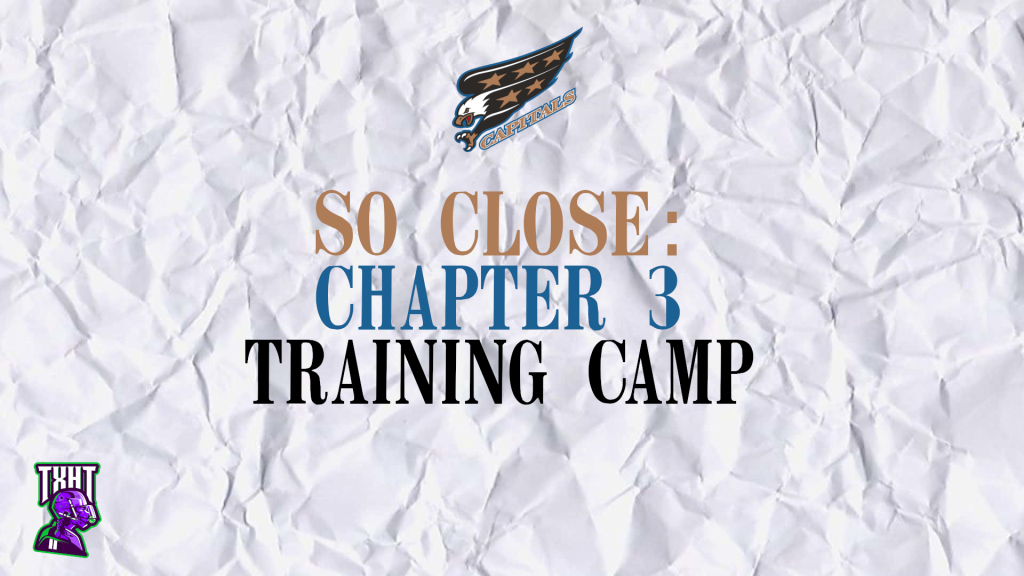
Coming Back to a New Regime
On September 9th, 1997 training camp for the Washington Capitals began, but like the typical first day of training camp, the players spent their time filling out forms and undergoing physical exams. Once those were all done, the players were excited to get back on the ice. For many it was a fresh start, for others an opportunity to prove they could be full timers on the Capitals.
“That’s the best part about the whole thing,” new Capitals coach Ron Wilson joked from his new office at Piney Orchard in Odenton, MD. “If I put hoops of fire out on the ice and told everyone to jump through the flames, they’d go. Changes like this seem to get everyone on their toes.”
“I would say the players understand this is a new regime, that they have to give us their best,” new general manager George McPhee said. “We don’t want them to leave it all in training camp, but the young guys realize there are jobs to be had.”
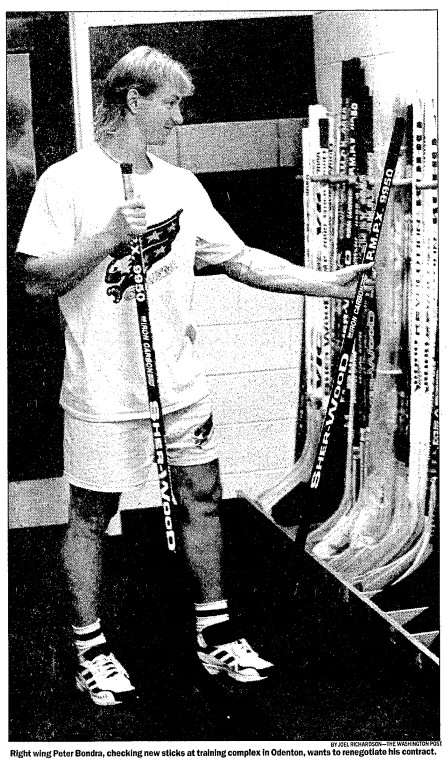
After having a disappointing season that saw the team go 32-40-9 and miss the playoffs, most players seemed eager to make a fresh start. “We’re anxious to get going because of last year, but we really do feel good about what we can do this year,” defenseman Joe Reekie said. “Joe [Juneau] and Adam [Oates] have been skating real fast, real smooth and handling the puck well, so it makes you feel pretty good about your chances.”
Wilson already looked to revamp the offense, and young players such as left wingers, Jaroslav Svejkovsky and Alexandre Volchkov, who spent most of the last season in the American Hockey League and juniors, respectively, would have a chance to make the regular roster. Defense, however, was harder to crack. Defensemen Sergei Gonchar, Reekie, Mark Tinordi, Calle Johansson, Sylvain Cote, and Phil Housley, seemed entrenched in the lineup. Ken Klee impressed his teammates last season with his dogged play, and Brendan Witt, who spent most of the last season with the Portland Pirates, expected to play full time in the upcoming season for the Capitals. Between the pipes, goaltenders, Bill Ranford and Olaf Kolzig, came into training camp as the starter and backup, respectively.
“I’m going into this with an open mind, with no real preconceived notions about anyone,” Wilson said. “This is going to be about them learning to trust one another and learning to trust the coaching staff. We’re going to keep it simple.”
Coming out of the first day of training camp, there was a sense of excitement about Wilson’s new system. “In the past, a lot of guys were really not allowed to do their thing,” forward Joe Juneau said, referring to former coach Jim Schoenfeld’s more conservative, defensive-oriented system. “We played games on our heels instead of going at them right away, but this should be a lot more fun for the fans and players.”
Juneau continued, “[We] won’t just be making sure [other teams] don’t score against us, we’ll be trying to score more than the other team. You can’t go in the game worrying about the other team. They should be worrying about us. We have a lot of depth at every position. We had a good team [last season.] We had the cards, they were just not okayed the right way.”
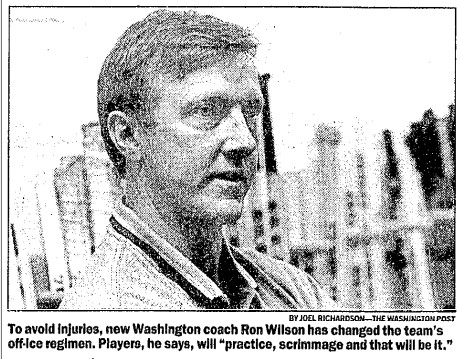
Another thing the players liked was the change to the team’s off-ice regimen. The change by Wilson was, in part, to help the players combat the exhaustion he believed contributed to a team-record 369 man-games lost to injury last season.
“Strength training will now be on individual programs, not in a group,” Wilson said. “I’m going to try to avoid using post-practice work as a form of punishment or conditioning. I believe in a day off a week to rest.” Wilson’s intention was for the players to practice and scrimmage, and nothing else.
Learning the New System
After getting the players on the ice for the first time for training camp, Wilson was happy to see the enthusiasm. “Everyone was paying attention, especially in practice,” he said. “Being the first day, some guys get a little nervous, but we’ll give them a few days to settle in.”
One player Wilson took notice of was forward Chris Simon. Simon had spent the summer rehabilitating his lower back and improving his conditioning. After being acquired from the Colorado Avalanche in November of 1996, Simon missed 26 games with injuries and was hampered in several others. He also missed training camp last season, as he had extensive, and eventually-failed, contract negotiations with Colorado.
“I think last year was very disappointing for myself, in that a team made a trade for me and paid me what I was asking and then I was injured all year,” Simon said. “I did commit myself this year, finally. Usually I dread coming to camp because I’m not in shape, but this year, I feel great.”
As training camp progressed, Wilson looked to get the defense more active in the team’s offense. “We want to get our defensemen involved in the offense, and that’s one of my goals in the first week to set that seed in their head,” Wilson said. “Of all people, Joe Reekie scored a goal [during the scrimmage]. That’s a scary thought right there. We’ll worry about defending a little later as camp goes on; right now I want to get their feet moving and involved in the offense.”
One player Wilson wanted to excel under his system was defenseman Brendan Witt. Witt was criticized by the former regime for abandoning his defensive role to get involved in the offense, but a 30-game stint in the minors and the new attitude in Washington, gave him the right skills for the right time. “With a new coaching staff, it’s a different philosophy and we can start with a clean slate,” Witt said. “I’m feeling more comfortable jumping in the play, realizing where everyone is. Last year, it seemed you get so scared to make the mistake. This year it’s more positive and try to make plays. We’re not going to be playing run-and-gun hockey, but he wants the defense to be an option, a threat.”
“This is going to be a breakthrough season for Brendan,” Wilson said. “He was involved in the offense, got some hits and was involved in a fight. He looks like he’s a real team-type person; I like that. The enthusiasm he brings is going to be very important to our team.”
Heading into training camp, the players heard that McPhee and Wilson wanted to make the offense more creative and lighten the team’s rigorous conditioning program. However, theory and practice were two different things, and after a few days of training camp, the players have a better idea. “Practice was really high-tempo, and the drills were a lot different,” forward Kelly Miller said. “There’s more flow, more skating and more catching passes at full speed. It’s really very interesting.”
“You noticed it from the first practice,” defenseman Calle Johansson said. “Everybody’s been saying it. Before, it was skate up the ice, take a slap shot, stop. Now you have to think a little bit, pass the puck and really just use your brain a little bit, more than in the past.” For Johansson, this was the first time he saw this style of practice in Washington, but it was familiar to him from when he was growing up in Sweden.
In fact, Wilson played in Europe for 6 years, and he applied some of those lessons he learned to how he coached. “The way practice is structured I picked up from a couple of Swedish coaches that I enjoyed playing for,” Wilson said. “I enjoyed the practices, the tempo, and I felt I was in the best shape of my life. My practices aren’t static, where you stand and watch and move in straight lines. There’s a lot of circling, and you’re not stopping and starting everywhere.”
Another thing Wilson tried to help the players, was he posted explanations for all of the drills on the locker room bulletin board, so the players could familiarize themselves with their tasks before they stepped on the ice. Wilson also focused on the Capitals forecheck, as both McPhee and he agreed it needed vast improvement. “I don’t think they’re aggressive enough,” Wilson said. “There’s a lot of standing around. You have to be moving when you’re attacking and when you’re try [sic] to forecheck as well. I want to get people moving and start looking for holes and be ready to jump into them. The whole point of practice is to get guys to jump into open spaces.”
One player critical to how the team forechecked was Adam Oates. When coming to Washington in March via trade, Oates was critical of the Capitals’ relatively stagnant forecheck, but he noticed the differences under Wilson. “I found out when I came here they didn’t have a forecheck at all,” Oates said. “I’ve seen it a few times with [Peter Bondra], where he plays the defensive spot. I get on him, I say ‘you can’t do that,’ and he says, ‘I’m so used to being defensive-minded.’ Obviously we don’t want to give up defense, but here’s a guy scoring 45 goals who could probably score another 10. There will be times when we’re at their end and he’ll be backing up because that’s what he’s been told to do for so long. I’m not a guy who ever wants to be backing up if I don’t have to.”
First Test of the Preseason
On September 14th, 1997, the Capitals played in their first preseason game in Albany, NY to face off with the New Jersey Devils. The game would show a Capitals team trying to make the transition from a grinding defensive system to a more creative offensive system. Unfortunately for the Capitals, they were a team trapped somewhere in the middle.
The Capitals looked confused at times, and toward the end of the game, they looked tired as they lost to the Devils, 4-1. The game also saw the Capitals get outshot by the Devils, 41-16. However, head coach Ron Wilson was more concerned with player evaluation than with the final result of the game. “We had quite a few young defensemen we gave an opportunity to, and we are trying to change the way we play a little bit,” Wilson said. “It’s a learning process and it identifies some things we need to work on in practice: forechecking, faceoffs, faceoff coverage, and of course some work in the defensive zone.”
On September 17th, 1997, the Capitals began a road trip involving four games in 4 days; a schedule Wilson would not have chosen. “It’s good to get games, but it’s not good the way we are doing it,” Wilson said. “Traveling all over the place, we are going to be tired and we don’t have much quality practice time.” This was the team’s first set of four games in 4 days too, with the Capitals ending preseason with another stretch of four games in 4 days.
“I can’t play guys three nights in a row, so we go into the last four exhibition games with six lines out of necessity,” Wilson said regarding his decision to keep enough players on hand to carry the load. “We’ve got to get down to more workable numbers, but the four and four really handcuffs us.”
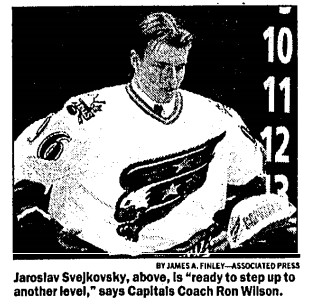
On September 23rd, 1997, forward Peter Bondra had been suspended, so Wilson turned to Jaroslav Svejkovsky, 20, to skate in Bondra’s place in their preseason game against the Philadelphia Flyers. “He’s been excellent,” Wilson said. “I think he’s ready to step up to another level in terms of scoring goals. We want to play him on one of our top two lines.”
Svejkovsky, who played 19 games with the Capitals the previous season, said he felt better at this training camp than at the previous year’s. “Being in Portland really helped me a lot,” Svejkovsky, whose nickname was “Yogi,” after the cartoon bear, said. “The hardest for me was the defense, and I think I’ve improved there. I feel comfortable out on the ice.”
After losing their first preseason game and the suspension of star winger Peter Bondra over a contract dispute, the Capitals would go undefeated (6-0-2) to finish the preseason. “It’s been a very competitive training camp. It kind of gets me salivating about how good we might be. We certainly have more confidence built up,” Wilson said.
Contract Negotiations
Sergei Gonchar
The Capitals welcomed 68 players to training camp, though one was absent. Defenseman Sergei Gonchar, a restricted free agent, remained in his native Russia while waiting to come to terms on a new contract. Gonchar told the press in a phone interview he planned to play with a team in Russia while his agent, Jay Grossman, and McPhee worked out a deal.
“I’m just waiting,” Gonchar said. “I’m ready to miss all of training camp, but I’m skating here every day to keep myself in shape.”
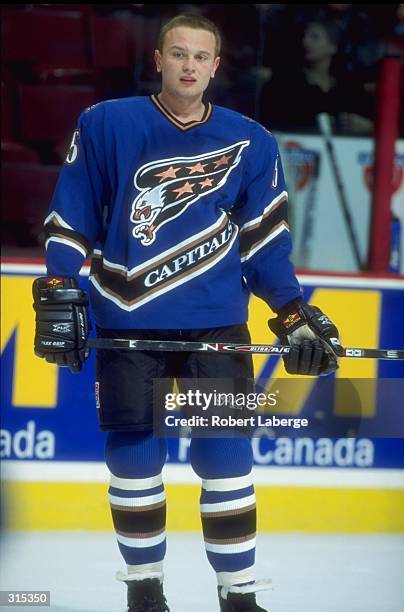
On September 10th, 1997, Gonchar’s agent publicly spoke on the contract negotiations, and it was not all positive. “A trade is where I see this heading because a deal doesn’t look likely,” Grossman said. “Their offer would put him virtually as the lowest-paid defenseman on the team. We’re looking for a deal that would put him in the middle of the players he’s comparable to on the team, in the league.”
Grossman continued, “I just don’t think we’re getting anywhere. The answer seems to be to seek a move because I don’t see any way he’s going to get the compensation he’s looking for.”
McPhee noted Grossman had not requested a trade directly, but the comments were not surprising. “It’s what they resort to when they’re not getting their way,” McPhee said. Last season, Gonchar made $400,000, and with that contract expired, he was seeking between $1.5 million and $2 million a year. As a restricted free agent, the Capitals owned his rights, but other teams could sign him to an offer sheet. However, no teams pursued him, and if they did, the Capitals had the right to match any offer sheet or receive draft picks as compensation.
According to the NHL Players Association, going into the 1997-98 season Mark Tinordi is the Capitals highest-paid defenseman ($2.575 million), followed by Phil Housley ($2.5 million), Sylvain Cote ($1.5 million), Brendan Witt ($1.4 million), Calle Johansson ($1.25 million), Joe Reekie ($965,000), and Ken Klee ($475,000).
During the 1996-97 season, Gonchar did not meet expectations with 13 goals and 17 assists in 57 games played, even though he did lead Capitals defensemen in goals, and was second to Housley in points by defensemen. The former general manager David Poile called Gonchar “certainly one of the best young defensemen in the game right now.”
“I have no idea why they are taking the position they are,” Grossman said. “I know there are a number of teams out there who would love to take him in a minute, not only for the asset he is now, but for what he can do in the future.” However, unlike Poile, who was working on a long-term contract with Gonchar before he was released from the team, McPhee focused more on what Gonchar had accomplished than his potential.
“There’s a system in place that the older players, the longer they are in the league, the more benefits they reap,” McPhee said. “When a player is a bona fide player and an all-star, I’ll pay him that way.”
After the Capitals played their first preseason game, Grossman spoke to the press regarding Gonchar’s contract negotiations. “Part of it’s money, but part of it is also opportunity,” Grossman said. “We have to put him into an environment where he can flourish and get chances to play a decent amount. We think Washington still has to make some choices in that regard.”
On September 22nd, 1997, the Capitals resumed talks with Gonchar. With an October 1st deadline looming, both sides understood if Gonchar continued to play in Europe after October 1st, and a new contract were to be signed, Gonchar would need to go through waivers in order to play for the Capitals that season. However, the odds of Gonchar clearing waivers, and not being claimed by another team, was very slim. If that scenario were to play out, the Capitals would instead opt to wait until the summer of 1998 to re-sign Gonchar, thus leaving him out of the league for a year.
Peter Bondra
All Star right winger Peter Bondra, who had 3 more years left on his contract, but was trying to renegotiate, had been vague about whether he would report to training camp. “Peter hasn’t told me anything to indicate otherwise,” Bondra’s agent Rich Winter said. Bondra had been participating in informal skates at Piney Orchard for the past 2 weeks before training camp started. During the informal skates, Bondra emphasized he was excited about the new season, despite his contract situation.
On September 18th, 1997, via Bondra’s public relation’s firm in a statement, Bondra left the team that afternoon after a discussion with general manager George McPhee, where he told him he would not be playing in that night’s preseason game against the Florida Panthers. Bondra wanted to remain with the team and continue practicing, but McPhee would not allow Bondra to board the team bus or plane if he did not play in the game. According to the statement, Bondra “has been locked out and refused permission by general manager George McPhee to practice with the team. Furthermore, Bondra has been advised by McPhee that he has been suspended by the team due to the fact that he will sit out preseason games while his contract is being renegotiated.”
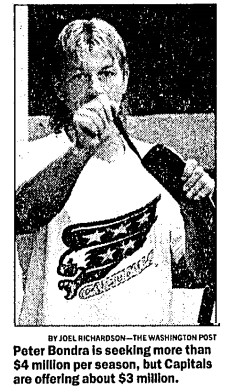
When asked if Bondra had been suspended by the team, McPhee said: “No. He called me this afternoon and said he was not going to play.” McPhee also said the team would make an official statement at a later time regarding the situation.
Bondra’s contract had been in discussions for renegotiating since the 1996-97 season, when David Poile was still general manager. Bondra’s then current contract was scheduled to pay him $1.75 million for the 1997-98 season and $2 million for the following two seasons. Bondra’s agent, Rich Winter, said the reason Bondra did not want to continue to play in any preseason games until a new deal could be agreed upon was because he was “concerned about the possibility of a serious injury.” Per League sources, the Capitals offered Bondra between $3 and $3.3 million for the remainder of his contract, and they also wanted to add at least 1 more year to the deal. Per those same sources, Bondra’s camp was looking for more than $4 million per season.
This would mark the second time Bondra held out. Fellow Capitals forward Michal Pivonka and he played seven games with the Detroit Vipers of the International Hockey League at the start of the 1995-96 season while their contracts were being negotiated.
Coach Ron Wilson expressed disappointment over the developments. “I’m disappointed because we’re trying to create some chemistry among some players, so that process is going to be on hold for a while, but it gives me the chance to give some other players a chance for a while,” Wilson said. “No one’s going to take Peter’s job, but for some guys, it’s a chance for an upgrade, like from coach to first class.”
On September 19th, 1997, McPhee announced he would not negotiate a new contract with Bondra until he returned to training camp and played in the team’s remaining preseason games. When telling Bondra he was suspended, McPhee informed him his stance was a violation of his current contract, and Washington was formally suspending him. “As a result of the breach, there will be no further discussion until the club has a commitment that the player will report to camp and practice and play,” McPhee said, reading a statement. “We explained that he was under contract for 3 more years and that fact could not be ignored. Furthermore, this was not fair to his teammates.”
When reached at his Maryland home for comment, Bondra said, “They agreed to renegotiate last year, and we’ve already tried to push them” in other ways. “My bonuses are so high, it’s hard to play for the team the way it is right now. I’m not even looking for market value. We’re just trying to get a fair deal.”
The Capitals position with Bondra also resembled what the Philadelphia Flyers were working on with forward John LeClair. LeClair, like Bondra, was also widely considered underpaid, and both had 3 years left on their deals. However, unlike Bondra, LeClair would not report to training camp when it started, and the Flyers would not continue the negotiations until LeClair returned to camp, which he did the day Bondra was suspended by the Capitals.
Another comparable was Phoenix Coyotes forward Keith Tkachuk, who also wanted to renegotiate his contract. What the Coyotes did was different from the Capitals and Flyers. Instead of suspending Tkachuk, the Coyotes told him they would rather he practice with the team but not play because of the possibility of injury, the same stance Bondra held. “[McPhee] has some rules and I know everyone has to respect them,” Bondra said. “But I don’t want to play right now, because if I get seriously injured, we probably won’t be able to do a new deal. And that’s when you get injured, when you are trying hard not to be and your mind isn’t completely in the game. I do want to practice, and that’s why I’ve been at training camp the whole time. This is an exciting season for us and we have a new coach to learn from, too.”
On September 22nd, 1997, Bondra’s situation remained the same as McPhee would not reach out to discuss a new deal. “We’re going nowhere,” Bondra said. “I can tell George that I will be in practice, but I can’t promise him I’d play in a game, because I’d be looking over my shoulder the whole time to be sure no one is going to slam me into the boards. It doesn’t seem like he’s even interested in picking up the phone to work out [a new contract.] I can call out a window, but I don’t think that’s going to help. I mean, look at Keith Tkachuk. Why can’t we do something like that here?”
Contract disputes remained in the air, and the regular season was about to begin. Stay tuned for Chapter 4 – The Start of the 1997-98 Regular Season.

TXHT may earn an Affiliate Commission if you purchase something through Cool Hockey and Dr. Squatch ads/links in this article.
RESOURCES
- Alexander, Rachel. “Gonchar Might Start Season in Russia,” September 4, 1997. https://www.washingtonpost.com/archive/sports/1997/09/04/gonchar-might-start-season-in-russia/d84e726f-4d63-402c-a06d-6ca3e0fe1f8c/.
- Alexander, Rachel. “For Caps, Time for a New Beginning,” September 9, 1997. https://www.washingtonpost.com/archive/sports/1997/09/09/for-caps-time-for-a-new-beginning/2a6ccf2a-a6d6-424b-8a56-567d843d4fe7/.
- Alexander, Rachel. “Caps Are Happy Campers: However, Gonchar Remains in Russia,” September 10, 1997. https://montgomery.idm.oclc.org/login?url=https://www.proquest.com/hnpwashingtonpost/historical-newspapers/caps-are-happy-campers/docview/1453720288/sem-2?accountid=47412.
- Alexander, Rachel. “Gonchar, Capitals Maneuver,” September 11, 1997. https://www.washingtonpost.com/archive/sports/1997/09/11/gonchar-capitals-maneuver/9b26415c-4305-444f-9a4f-d17244812490/.
- Alexander, Rachel. “Capitals Want the Defense Involved in Their Offense,” September 12, 1997. https://www.washingtonpost.com/archive/sports/1997/09/12/capitals-want-the-defense-involved-in-their-offense/b84894d6-af14-4c2d-a7b9-e52ddd3a695e/.
- Alexander, Rachel. “Caps Praise New Practice Regimen,” September 13, 1997. https://www.washingtonpost.com/archive/sports/1997/09/13/caps-praise-new-practice-regimen/e77dd98c-36e4-4c7f-8cf6-1bdff293d4e5/.
- Alexander, Rachel. “In Opener, Not Much Of an Exhibition,” September 15, 1997. https://www.washingtonpost.com/archive/sports/1997/09/15/devils-4-capitals-1/58ab7e8a-8674-47de-88db-41efc55b15aa/.
- Alexander, Rachel. “Wilson Wants Capitals To Give Their Best Shots,” September 16, 1997. https://www.washingtonpost.com/archive/sports/1997/09/16/wilson-wants-capitals-to-give-their-best-shots/ba55ac4a-6ac8-4e33-a4f5-94933ade3699/.
- Kuhns, Will. “Capitals’ Road Show Getting an Early Start,” September 17, 1997. https://www.washingtonpost.com/archive/sports/1997/09/17/capitals-road-show-getting-an-early-start/9cdecf03-e26d-4188-9134-ee52402bd315/.
- Alexander, Rachel. “In Contract Talks, Bondra Leaves Caps,” September 19, 1997. https://www.washingtonpost.com/archive/sports/1997/09/19/in-contract-talks-bondra-leaves-caps/f9b6d04e-3996-4d7b-95a4-0623249960a5/.
- Alexander, Rachel. “Bondra Told to Join Caps Before Any Negotiation,” September 20, 1997. https://www.washingtonpost.com/archive/sports/1997/09/20/bondra-told-to-join-caps-before-any-negotiation/2d42e313-f7a0-4d18-8ac5-04f8823dd5f4/.
- Alexander, Rachel. “Gonchar, Capitals Resume Talks,” September 23, 1997. https://www.washingtonpost.com/archive/sports/1997/09/23/gonchar-capitals-resume-talks/13cd1fc4-01a7-429e-93db-1d360c8da39c/.
- Alexander, Rachel. “With Bondra Out, Svejkovsky Steps In,” September 24, 1997. https://www.washingtonpost.com/archive/sports/1997/09/24/with-bondra-out-svejkovsky-steps-in/b25dab70-6a04-49e3-b523-505a2bc40f75/.
- Alexander, Rachel. “Capitals Nurture Their Young,” September 30, 1997. https://www.washingtonpost.com/archive/sports/1997/09/30/capitals-nurture-their-young/4334eaba-ab08-4960-981e-db587e93eb64/.
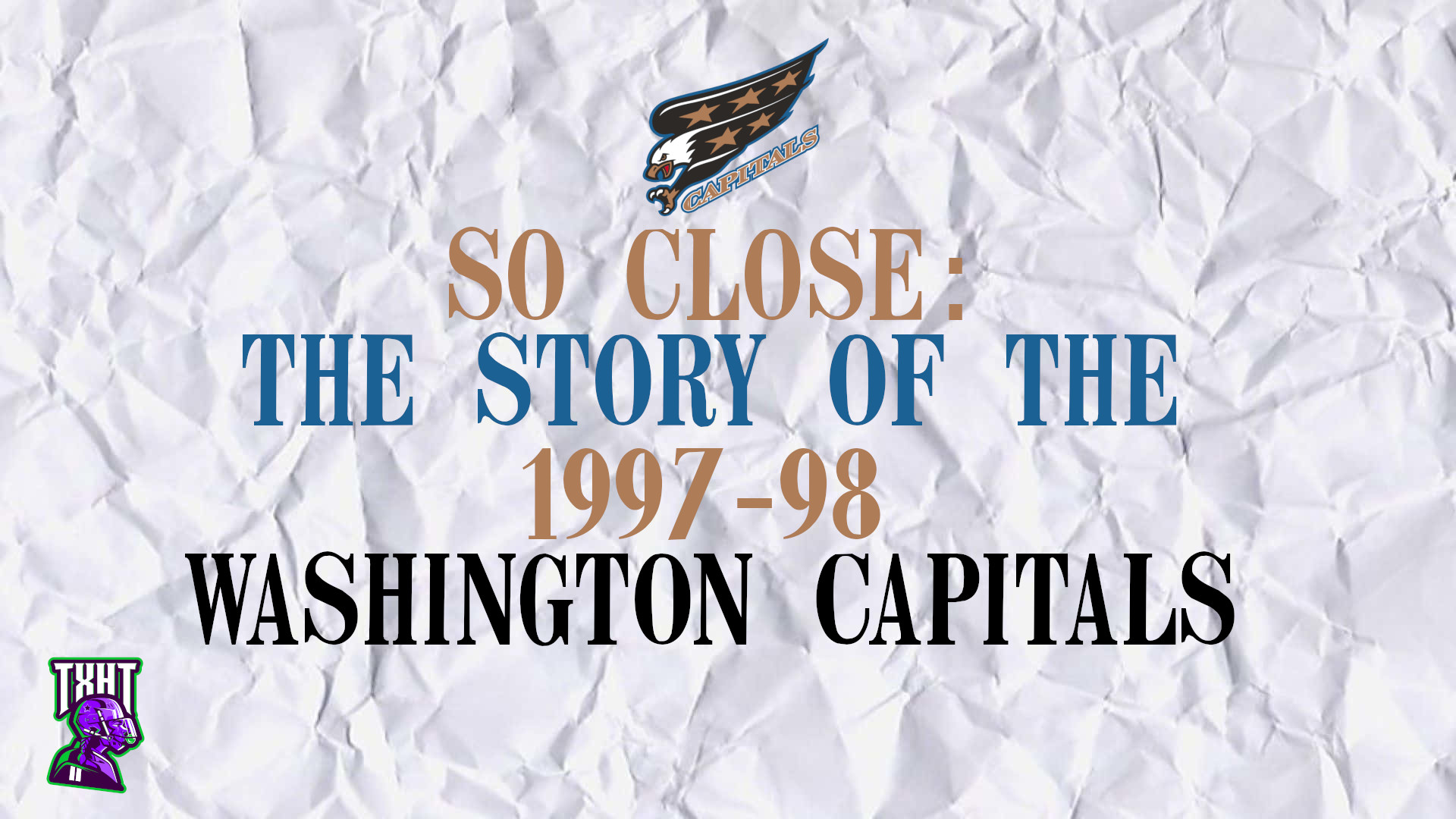
Leave a Reply